Photographs: Patrick Bensamou / Wikimedia Creative Commons Abhishek Mande
In city that's always on the edge over rickshaw fares and rude auto drivers, Rickshawale.com is trying to change things in Mumbai with its first ever dial-a-rickshaw service
Anyone who's ever lived in Mumbai will probably tell you the hell they have to go through to get an auto rickshaw.
The three-wheeler, which runs only in the suburbs, has been a standard mode of transport for more than three-fourths of the city's population.
Yet, in the recent past Mumbai's love for the rickshaw has been clouded by strikes, meter tampering and drivers refusing fares.
Commuters too have hit back by staging their own boycotts refusing to take rickshaws and in some unfortunate cases getting into fights with drivers.
The struggle between the commuters and the drivers has recently taken an even uglier turn as political parties have made it their agenda to burn auto rickshaws and beat up drivers.
Rickshawale.com is a first-of-its-kind dial-an-auto rickshaw service that started on October 12 hopes to reduce some of these problems if not all.
They claim to use untampered meters, ensure polite drivers and promise never to turn down a fare. For a city that is almost always on its edge, this is a good start and a novel concept.
Rickshawale.com has been founded by three men -- Gaurav Kohli, a techie, Hemant Jain, a CA and Sandeep Agarwal, a logistics businessman.
Kohli spoke to us about why they started this enterprise and how they plan to make it work.
'Mumbai has 2.5 lakh rickshaw drivers'
Photographs: Sajjad Fazel / Wikimedia Creative Commons
How did the idea for a dial-an-auto service come about?
There were a number of reasons. Mumbai has a very high number of rickshaws and rickshaw drivers. While official figures peg the number at 1.5 lakh drivers, the real number I believe is closer to 2.5 lakh.
A large number people's lives -- be it drivers or commuters -- revolve around rickshaws.
With the city expanding rapidly rickshaws are being seen as the most efficient and inexpensive mode of transport.
Recently, a lot of passengers complained that rickshaw drivers refused fares, tampered with their meters and overcharged.
Passengers who have to travel to the airport early in the mornings or late in the night would usually have to depend upon radio taxis to ferry them from their homes to their destination.
On other occasions, radio cabs tend to turn down short distance fares. This leaves the passengers in the lurch.
We launched Rickshawale as a platform that would connect the passenger with the rickshaw driver. Unlike radio cabs, we don't turn down a fare and we have no biases against short distances.
We give both, the passenger as well as the driver the freedom to choose so you can travel around your plan and not plan around your travels.
'Ours is a 'garib rath' version of radio cabs'
Photographs: Arun Patil
How's your model different from the many radio cab operators that ply in Mumbai?
Unlike the radio cab operators we don't own any of the vehicles. What we do have is a pool of about 300 rickshaw drivers who are registered members of Rickshawale.
All three of us -- Hemant Jain, Sandeep Agarwal and I -- were sure that we didn't want to go in for a capital-intensive radio cab service but rather a 'garib rath' version of it!
Since we don't own any rickshaws we couldn't add or remove anything from it. So we decided to give the drivers a hand held device that tracks their location and also works as a buzzer enabling them to communicate with us.
This also helps because the device stays with the drivers and isn't stuck to rickshaws, which are often shared by two or more drivers in a day.
The 300 drivers that have joined us in the first phase of this enterprise are also given ID cards and a mobile SIM card and talktime to communicate with passengers.
Could you tell us how you approached the drivers?
We went out and spoke with them. There was a database of about 4,000 drivers that we'd got through various sources. So we reached out and addressed these people and explained to them how they stood to gain by with us.
At the end of this exercise, on August 14, we drew up the final list of 300 drivers who would be the first set of people who we would deal with.
There was a reason we capped it at 300. Each driver that is currently working with us has to submit a list of documents -- from proof of identity and residence to his permit and driving licence. In turn, we back checked these details.
We did get a lot of more applications, which we filtered out because they didn't have the requisite documents.
In the coming months, we are hoping to increase the number.
'We ensure that the driver gets his money's worth'
Photographs: Cedric SF / Wikimedia Creative Commons
How do the drivers benefit?
Drivers are our partners and not our employees.
Among the benefits we offer, we promise them at least two to three long-distance fares, free PUC twice a month, free towing, genuine spare parts at wholesale rates and a mediclaim policy which covers driver's hospital expenses in case of an accident.
The convenience fee of Rs 20 that we charge from our passengers also goes to the drivers to compensate them for the distance they have to cover without a fare to pick up a passenger.
In return, the drivers have to pay a membership fee of Rs 151, a monthly fee of Rs 999 and a one-time fully refundable deposit of Rs 1500 for the tracking device, which can be paid in three instalments.
We also make sure that if a certain driver hasn't done enough business with us during a particular day we give him higher priority towards the end of that day. This way we ensure that the driver gets his money's worth.
Moreover, we have also given them soft skills training -- how to approach a passenger, how to present oneself and one's rickshaw.
Most of all, every Rickshawale driver runs what is called the 'Gandhi meter', which means it isn't tampered.
All of this has changed not just the way their passengers look at them but also the way their peers perceive them. Eventually we're hoping to start out a micro-credit scheme, which will help out drivers in need.
The idea is to raise an auto driver's standard of living, slowly but surely.
'Need at least 800 drivers to break even'
Photographs: Michael VerhoeF / Wikimedia Creative Commons
How does the tracking device work?
These devices are small boxes made out of tough polycarbonate plastic and work on SIM cards.
We've tied up with Loop and have identified over 3000 locations (corresponding to their towers) and have designed an ERP solution (called Rickshawale Trip Organiser) which along with these devices help us track the exact location of our drivers.
Using this information, when we receive a call, we send out a signal to about 5-6 drivers who are in and around the area.
The devices have been designed such that they act as buzzers. The drivers can use them to indicate that they're willing to take up the fare. If more than one driver responds we give preference to the one who pressed the buzzer first.
That driver is then sent complete details of the passenger via SMS. Simultaneously the passenger receives a similar SMS with the details of the driver and his rickshaw number.
That is how we connect the two parties.
Our software has the ability to send out messages in Hindi and Marathi, the two languages that most drivers speak.
However most of them use China-made phones, which are not compatible with these languages.
We're addressing this issue in the next batch of tracking devices, which will have a small screen that can display messages in Hindi, Marathi and English.
This tracking device serves the same function as the device in radio cabs. Unlike that one which costs Rs 70,000, this one costs around Rs 7,000. Since we had placed a bulk order we managed to get the cost down to Rs 2,500.
What is the kind of investment that has gone into your venture?
Between the three of us we've invested about Rs 65 lakh, most of which has gone into procuring the place that we are working out of and developing the product. Besides that we spent some money in approaching the drivers and a small fraction in marketing.
We need to sign up at least 800-1000 drivers to break even on the operating costs and we hope to reach that figure by Feburary.
'People in Mumbai have a strong bias against rickshaw drivers'
Photographs: Arun Patil
How do you plan to expand the business?
In the next four months we're hoping to cover Mumbai's satellite towns of Thane, Navi Mumbai, Kalyan-Dombivali etc.
Our aim is to have about 5,000 rickshaws in the first 18 months and eventually expand to cities such as Pune, Chennai, Hyderabad and Bangalore.
We have been getting requests from people who want to partner with us and take this model to their cities.
Eventually we also hope to expand our services to taxis and apply the same model there.
What were the greatest challenges you faced while setting up Rickshawale?
Breaking through to the drivers was the most difficult. It was a challenge to make him understand that we were running this for him. Ours is not a plan where the driver is exploited but it was a task to convince them that it benefits them to be part of this endeavour. It took us some time to break through and get into the community and convincing them that they too would benefit from this.
Bringing down the costs was another challenge. When you're running a company of this size, even a saving of Rs 100 makes world of a difference.
Creating a good costing model that works for the driver, passenger and us. It took a lot of efforts for instance to come to the figure of Rs 33 per day that we are charging the rickshaw drivers to be part of Rickshawale.
Finally, what were your learnings?
We aren't an NGO where social cause is the ultimate goal but one of the things we are hoping to do via Rickshawale is to better the conditions of the drivers. And one of our first learnings was that whenever you have a business that is socially motivating, the support you get is tremendous. We've been getting great support from all quarters.
The second learning was that everything that can go wrong will go wrong! On the first day for instance we got over 900 calls. Our call centre was equipped for just 480! Our servers froze; we had to buy new servers! This was just one of the many instances!
Finally, most people in Mumbai have a strong bias against rickshaw drivers. What we don't know is that these people are as hardworking and aspirational as anyone else. There's one driver whose son studies in the US and another one whose son is an IIT student. It was a great learning to understand their dreams and aspirations.

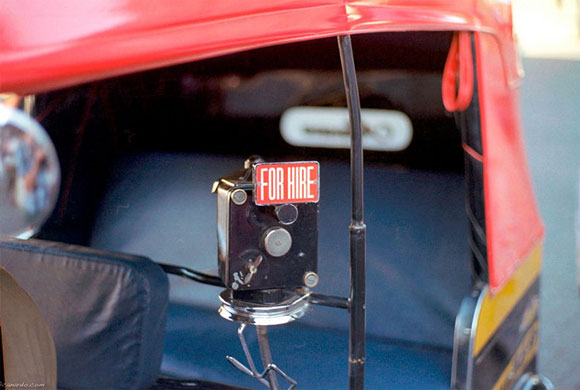
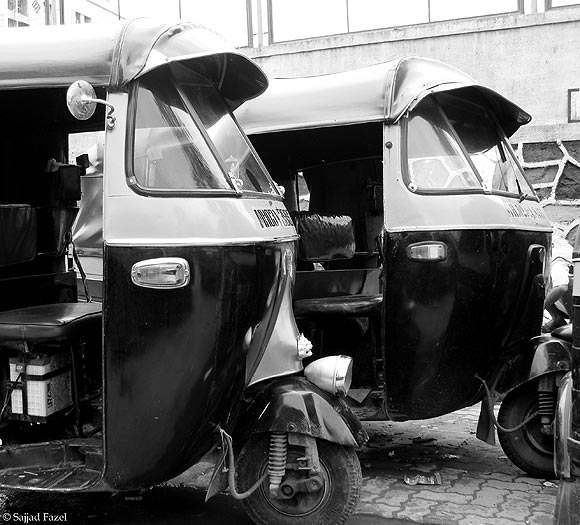
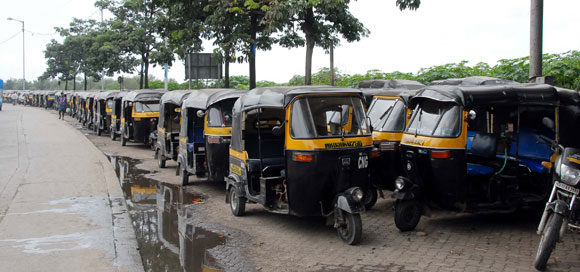
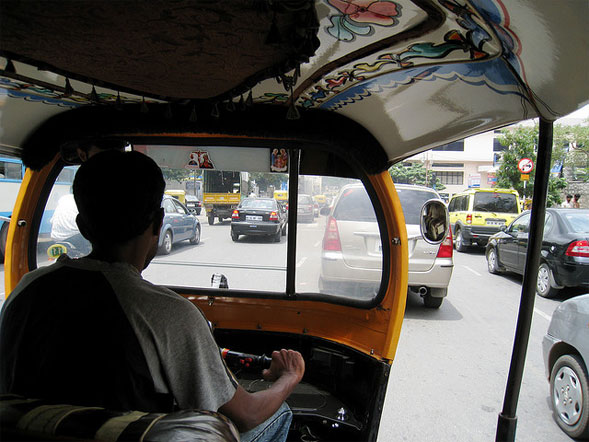
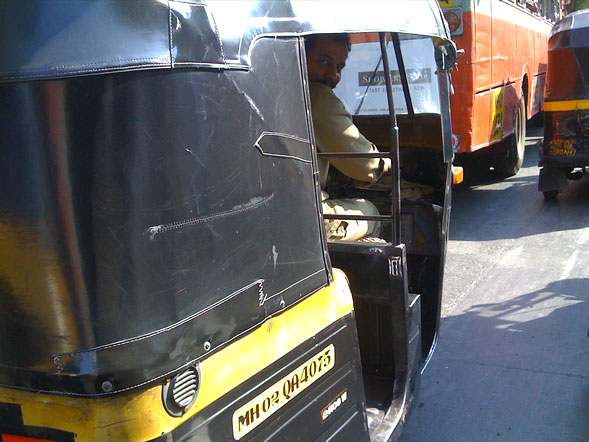
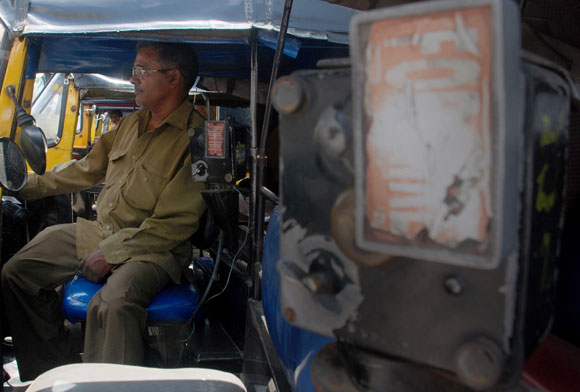
Comment
article